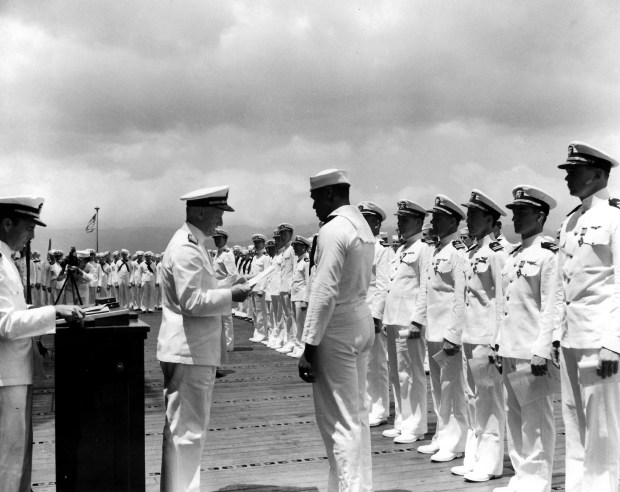Secretary of Defense Pete Hegseth has evicted an anthology I co-edited with philosopher Laura Westra from the U.S. Naval Academy library. I don’t know about Laura, but I’m pleased that they thought some midshipman may want to read “Faces of Environmental Racism,” published initially in 1995. In the 30 years since, we may have poisoned the minds of some midshipmen who are now captains or even admirals. Or Hegseth may just be protecting young sailors with dust allergies from picking up the book.
My more serious guess is that the term “racism” is the reason for the book’s expulsion. It combines case studies with theoretical analyses of racism in public and private decision-making, mostly regarding land use. The subject is environmental racism, a subtopic of environmental justice. I am among a handful of people who, entirely independently of one another, coined the term “environmental justice” in the early 1980s, and my book “Environmental Justice” (State University of New York Press, 1988) is the first to use the expression anywhere in the title or subtitle of any book.
The administration of President Donald Trump has a penchant toward one-sided views, which explains its attempts to stifle alternative narratives, claiming them to be one-sided, which they often are. Consider critical race theory. In my view, it’s supported by a great deal of evidence, but it’s one-sided. Progress in race relations is given short shrift.
Similarly, but on the opposite side, Thomas Sowell’s “The Vision of the Anointed” castigates liberals for claiming that they alone occupy the moral high ground. Sowell is correct about liberals, but his thesis that only liberals do this is all wrong. He ignores conservatives doing the very same thing — for example, “the moral majority.” Both critical race theory and Sowell’s view are valuable contributions, so long as alternative views are available, just as two sides are typically presented in judicial proceedings.
Apparently, Hegseth doesn’t want young minds polluted by knowledge that the interstates they travel on through cities required destruction of mostly minority communities; toxic waste is still located mostly near such communities; and air pollution and cancer rates remain higher there than elsewhere due to incineration and oil refining.
My contribution to the anthology mitigates the concentration on race. The disproportionate harm to minority communities, which are often poor, may result from poverty rather than race. Land is cheaper where poor people live, so the cost of destroying a community or lowering its land values due to pollution is less. Harming minorities follows from cost-benefit analysis. It reduces the monetary cost to society of promoting our material way of life. Informed discussion requires attention to both benefits and burdens. My article offers a procedure to reduce injustices caused by using only monetary measures of benefits and burdens when lives are at stake.
While all of us tend to appreciate the presentation of our own side more than that of the other side, the Chinese have been more open than Hegseth to my presentations, and that of others, on environmental matters. The Chinese government gave a grant to Northwest University in Xi’An to translate and publish Western works in environmental ethics. My book “Environmental Justice” was published in 2007 by the Shanghai People’s Publishing House.
In 2015, the Chinese government paid me to give lectures at two universities in Xi’An based largely on this book. Xi Jinping was already the head of government, so I asked my host if I should really lecture students and larger gatherings of academics on the importance of human rights. I was told that this was fine, so I went ahead.
Such tolerance continued for years while Xi maintained his power. In 2021, a second translation of my book was published in Chinese, this time by Truth and Wisdom Press. I find it odd that China, a notorious abuser of human rights, would subsidize the publication of a book presenting ideas at odds with its ideology, whereas the Trump administration considers my thoughts too toxic to remain in a government library.
We should heed the wise words of English philosopher John Stuart Mill in “On Liberty”: “He who knows only his own side of the case knows little of that. His reasons may be good, and no one may have been able to refute them. But if he is equally unable to refute the reasons on the opposite side, if he does not so much as know what they are, he has no ground for preferring either opinion.”
Leaders who stifled dissent, who insisted that only one side of important issues be presented — King Charles I of England and Adolf Hitler come to mind — didn’t serve their countries well. Currently, Nicolas Maduro, Vladimir Putin and the Kim dynasty, brooking no dissent, are devastating their countries.
We shouldn’t let that happen here.
Peter S. Wenz is an emeritus professor of philosophy at the University of Illinois at Springfield, blogger at peterswenz.com and author of the forthcoming book “Abortion Rights as the Free Exercise of Religion.”
Submit a letter, of no more than 400 words, to the editor here or email letters@chicagotribune.com.



